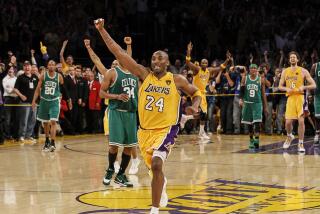Abernathy Cheated His Own Legacy : Civil Rights: His reflections on the movement merit reading. What he’ll be known for, though, are a few dubious pages giving aid to Dr. King’s enemies.
- Share via
In all of the controversy over Ralph Abernathy’s autobiography, the fact that it is about his life, and not Martin Luther King’s, has been lost. More attention has been paid to a couple of pages of dubious bedroom speculation than to the 600 pages that concern what Abernathy experienced directly during years of incredible conflict, tragedy and triumph. Our society remains more gullible to, and fascinated by, private sexual encounters, or groundless rumors about them, than it is interested in public racism, sexism and anti-Semitism.
It is a shame that all of the attention has gone where it has, because Ralph Abernathy played an honorable and significant role in the founding days of the civil rights movement. His work and his reflections on those years merit attention.
But it must be said that Abernathy is the cause of the misplaced focus surrounding his autobiography. By making sensationalistic claims about what happened in Memphis the night before Dr. King was assassinated, Abernathy appeals to the most prurient tendencies in current public life and gives comfort to the enemies of the civil rights movement who would use anything to discredit the movement.
His claims are highly suspect anyway. They directly conflict with the eyewitness accounts of two other persons present that night, including Dr. King’s executive assistant, Bernard Lee, who has refuted Abernathy’s speculations. Dr. King, also a witness, cannot speak for himself. Only his good works speak for him, and they are substantial. You finally know a tree, not by the bark it wears, but by the fruit it bears.
Abernathy surely has the right as an autobiographer to print the truth, but it is very questionable that he has done so.
No one will ever know for sure whether his charges are true, but he has succeeded in causing much confusion and pain.
He has certainly not acted in the spirit of friendship with Martin Luther King. Dr. King would never have done the same kind of thing to Abernathy. Indeed, Abernathy’s publication of conjecture about the unknowable--21 years after the death of Dr. King--is a deep betrayal of their friendship.
It is also very hurtful to Dr. King’s family and to the movement for social justice and civil rights of which Dr. King’s family is such an important part.
One must also suppose that it is also a very hurtful thing to the Abernathy family, whose longtime link in the public imagination to the King family would now appear to be broken.
By casting down rocks at Dr. King’s tombstone, Abernathy supplies Dr. King’s enemies with fresh ammunition. They were never shy about falsely accusing him in sullying his name when he was alive, but now, after his death, they have found a new and very unlikely friend in Abernathy. Already right-wing commentator Patrick Buchanan, speaking on behalf of Dr. King’s enemies and the enemies of social justice, has pounced on the new revelations, suggesting that we bring our national observance of Dr. King’s birthday into question.
But despite all of this immediate fallout, nothing--much less Abernathy’s questionable claims--could ever diminish the significance and moral power of Dr. King’s social vision and lifetime of service to humanity.
Dr. King led a veritable revolution in America and the world, elevating civil rights over “states rights,” equality over racial supremacy, creative nonviolence over violent suppression, world peace over military intervention and racial brotherhood over racial hatred.
The influence of Dr. King is felt today in Poland and in South Africa, in Hungary and Tien An Men Square. His spirit is present wherever people are struggling for justice against a violent oppressor. It continues to show us the way to community and away from chaos. Dr. King is still very much with us as “we stride towards freedom.”
To live as a close friend in the shadow of such a giant must be quite a burden, even 21 years later, and it has been frequently noted in the last few weeks that Abernathy was probably acting out of a deep sense of pain.
But Abernathy has not transcended his pain. He has simply redistributed it toward the King family. And, in so doing, he has not even successfully addressed his own legitimate need for recognition outside of Dr. King’s shadow.
Indeed, the most tragic thing about this episode is that the only thing that will be remembered about Abernathy’s autobiography is a few irrelevant and extremely dubious pages about Dr. Martin Luther King. But Dr. King, untouched by these pages, still stands as a giant among men, an enduring light through time, showing us the way out of the darkness and the chaos.
More to Read
Sign up for our Book Club newsletter
Get the latest news, events and more from the Los Angeles Times Book Club, and help us get L.A. reading and talking.
You may occasionally receive promotional content from the Los Angeles Times.






